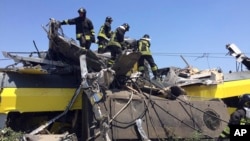Delayed rail improvements and the antiquated telephone alert system will be considered as part of the investigation into the violent head-on train crash in southern Italy that killed nearly two dozen people, officials said Wednesday.
Recovery operations using a giant crane and rescue dogs continued through the night and into Wednesday to remove the mangled debris of the two commuter trains that slammed into one another just before noon Tuesday in the neat olive groves of Puglia.
The official death toll stood at 23, but the prefect of Barletta, Clara Minerva, said relatives reported another four people unaccounted-for and suggested that their remains could still be in the wreckage, particularly in the area of highest impact.
After visiting the crash site, Premier Matteo Renzi declared it an "absurd'' tragedy and vowed to investigate fully. His transport minister was to brief parliament later Wednesday.
Union leaders and railway police blamed human error, noting that the particular stretch of track between the towns of Andria and Corato didn't have an automatic alert system that would engage if two trains were close by and on the same track. Rather, the system relied on stationmasters phoning one another to advise of a departing train.
The vice minister of transport, Riccardo Nencini, told RAI the lack of an automated security system "was probably one of the causes of the disastrous tragedy.''
Andria Mayor Nicola Giorgino said the crash was particularly tragic since work was to begin within a few months to build a second track on the route. Italian news reports said the work was supposed to have started years ago.
Trani Prosecutor Francesco Giannella said the delay in the track-doubling work would be part of the investigation. "We will investigate on the delays of the work on the line and on the deficiencies in the security system,'' the ANSA news agency quoted Giannella as saying.
Italian Red Cross workers on Wednesday were shuttling family members to the morgue in Bari, the regional capital, to help identify the dead. Coroner Francesco Nardelli said all 23 bodies had been positively identified, adding that around half were young people, ANSA reported. The train primarily served students and commuters.
Passengers described being thrown forward violently at the moment of impact, and then trying to free themselves from the tangle of metal, body parts and debris in the scorching midday sun.
"I don't know what happened, it all happened so quickly, I don't know,'' one woman, eight months pregnant, told The Associated Press. "I saw my mother on the ground, my father and my sister bleeding, I don't know, I don't know, even I don't know.''
One elderly couple described their ordeal to local television Telesveva. The man, his head covered in gauze, said he was knocked to the ground, while his wife described how she came across body parts as she freed him.
"I pulled him from under the debris, myself barefoot, from under the debris and metal,'' the woman, who was not identified, told local TV. "I went to my husband screaming. I pulled him by the legs and feet. I climbed past people in pieces - how sad. There was nothing I could do.''
The trains were operated by a private, Bari-based rail company, Ferrotramviaria, that connects the city of Bari with Puglia towns to the north and the airport. Ferrotramviaria's website said its fleet comprises 21 electric trains, most with four cars each.








